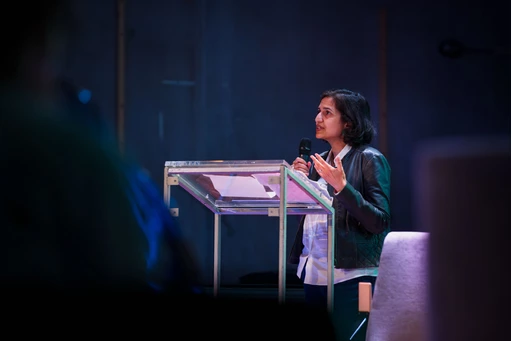
Colonial Lives of Property: Law, Land, and Racial Regimes of Ownership
Author(s)
Brenna Bhandar
This chapter, “Improvement,” from legal scholar Brenna Bhandar’s Colonial Lives of Property: Law, Land, and Racial Regimes of Ownership (2018) is one of the readings for the Amman reading group.
The Amman reading group was convened by artist-led research group Bahaleen involving locally-invited artists and researchers, as part of Usufructuaries of earth chapter two reading groups and slow-growing reader.
Chapter 3, “Improvement” from Brenna Bhandar's Colonial Lives of Property: Law, Land, and Racial Regimes of Ownership (2018).
Image: Brenna Bhandar contributing to the conversation “Life and Death Beyond the Boundary,” as part of Usufructuaries of earth convention, 24 May 2024, BAK, basis voor actuele kunst, Utrecht. Photo: Tom Phillip Janssen
Related
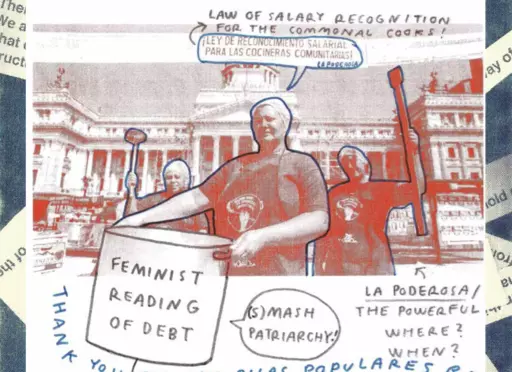
Held in the context of Usufructuaries of earth: chapter two, reading groups and publication, a reading group was convened by Iliada Charalambous and Philippa Driest on 28 April 2024 titled Undoing Debt, at KIOSK, Rotterdam. The reading group looked at debt as a form of gendered and financial violence and sought how to, in turn, “undo debt” through learning shared political tools and vocabulary inspired by transnational feminist movements.
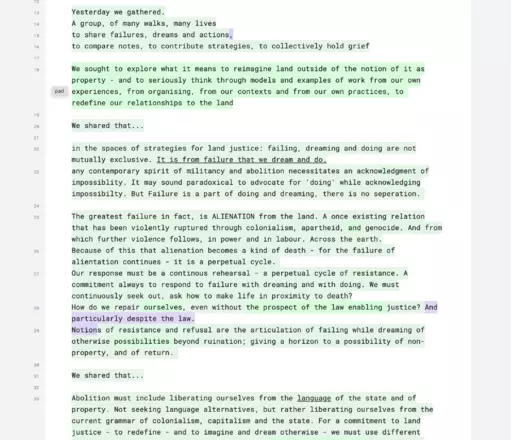
Convened by Johannesburg-based Yvonne Phyllis and MADEYOULOOK (Molemo Moiloa and Nare Mokgotho), the working session Failing, Dreaming, Doing: rehearsing abolition sought to conjure alternate imaginaries of life and labor with earth, beyond the regimes of colonial and racial enclosure. The following text was collectively written by the working session’s participants: Brenna Bhandar, Aya Bseiso, Layal Ftouni, Jennifer Irving, Tareq Khalaf, Gelare Khoshgozara, MADEYOULOOK (Molemo Moiloa and Nare Mokgotho), Marie Nour Hechaime, Yvonne Phyllis, Philip Rizk, Bobby Sayers, Shela Sheikh, and Kasia Wlaszczyk and was read out by Nare Mokgotho as part of “PROPOSITION 3 Failing, Dreaming, Doing: rehearsing abolition” during the Usufructuaries of earth convention public program, Saturday 25 May 2024 at BAK, basis voor actuele kunst, Utrecht.
________________________________________________________________________________
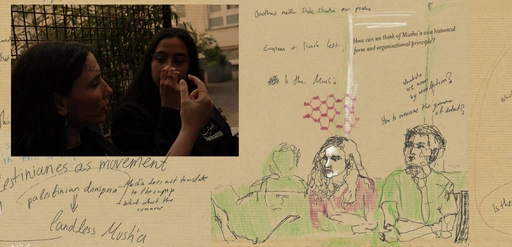
Held in the context of Usufructuaries of earth: Chapter two, reading groups and publication, a reading group spanning two days was convened by Joud Al-Tamimi and Lama El Khatib on 4 and 5 May 2024 titled And in your throats, a sliver of glass, a cactus thorn and On Value-Disrupting Activity, at bookstore خان الجنوب khan Aljanub, Berlin and Hopscotch Reading Room, Berlin respectively. Mokia Laisin put together a collaborative collage of annotations made during both days of the reading group discussions with input from Miriam Gatt on 4 May 2024.
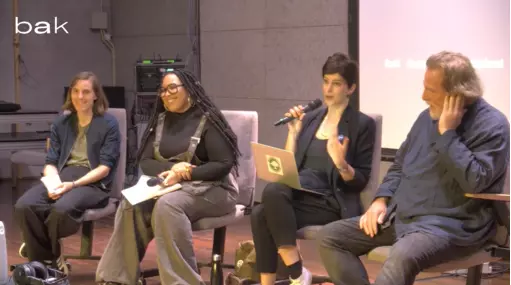
Held as part of day two of Usufructuaries of earth, chapter three, convention, on 25 May 2024, this video documents a closing conversation between Yvonne Phyllis, Denise Ferreira da Silva (online), Verónica Gago, Stefano Harney, Lena Wilderbach, and Brenna Bhandar (online), moderated by Shela Sheikh.
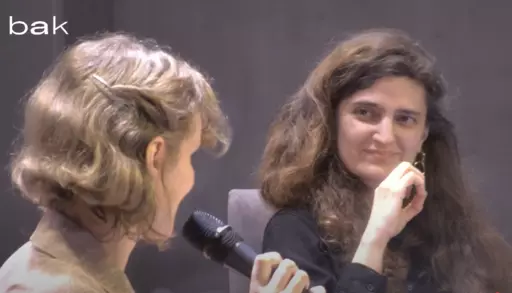
Held as part of day one of Usufructuaries of earth, chapter three, convention, on 24 May 2024, this video documents the words of welcome by Maria Hlavajova, followed by a conversation between Marwa Arsanios and Wietske Maas—as means of introduction to the Usufructuaries of earth public program.
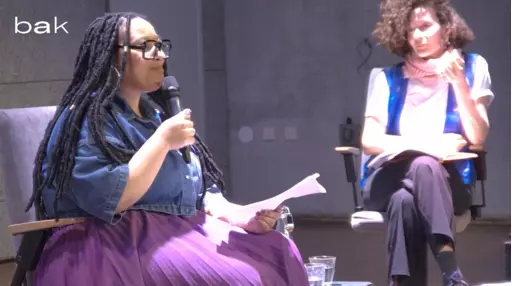
Held as part of day one of Usufructuaries of earth, chapter three, convention, on 24 May 2024, this video documents a conversation between Brenna Bhandar, Yvonne Phyllis, and Ruth Wilson Gilmore(online), moderated by Layal Ftouni.
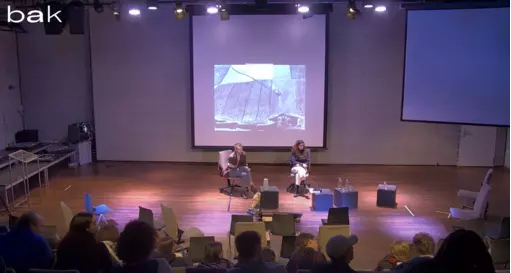
Held as part of day one of Usufructuaries of earth, chapter three, convention, on 24 May 2024, this video documents a conversation between conversation between Philip Rizk and Marwa Arsanios following a screening of Rizk’s film Mapping Lessons (2020).
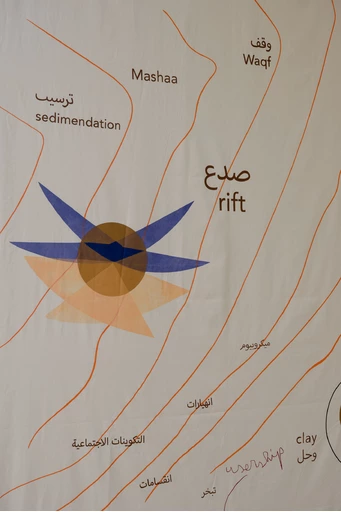
This essay, “Enclosures from Below: The Mushaa’ in Contemporary Palestine,” from geographer and researcher Noura Alkhalili is shared as part of the project Usufructuaries of earth, co-convened by BAK with artist Marwa Arsanios. It is one of the readings for the Amman reading group convened by artist-led research group Bahaleen involving locally-invited artists and researchers.
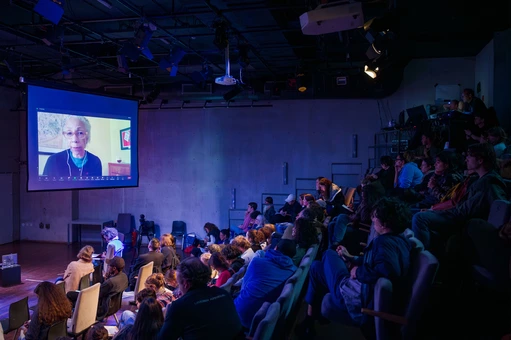
This chapter, “Scholar-Activists in the Mix,” from Ruth Wilson Gilmore's Abolition Geography: Essays Towards Liberation (2022) is shared as part of the project Usufructuaries of earth, co-convened by BAK with artist Marwa Arsanios. It is one of the readings for the Amman reading group convened by artist-led research group Bahaleen involving locally-invited artists and researchers.

This chapter, “Improvement,” from legal scholar Brenna Bhandar’s Colonial Lives of Property: Law, Land, and Racial Regimes of Ownership (2018) is one of the readings for the Amman reading group.
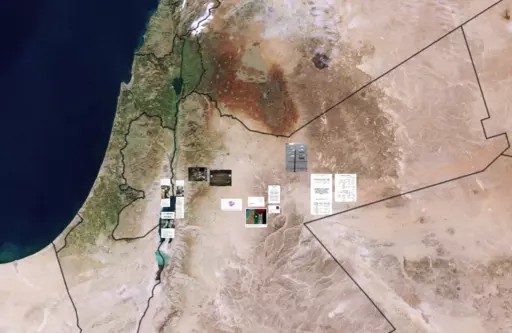
In the context of Usufructuaries of earth: Chapter two, reading groups and publication, a multi-day roaming reading residency, convened by the artist-led research group Bahaleen is held from May 9–13 2024, along the hilltops of Jerash and the edges of Palestine—an hour’s drive from Amman. Invited artists and researchers join Bahaleen in traveling by car and on foot, navigating notions of access and return. Together they grapple with the possibilities of disruption and dissent, aiming to articulate a liberatory vision of the commons from within this geopolitical conjuncture. During the reading residency a board of images and sources were assembled as a harvesting. The images are shared below as screengrabs from this image board, with accompanying links where appropriate.
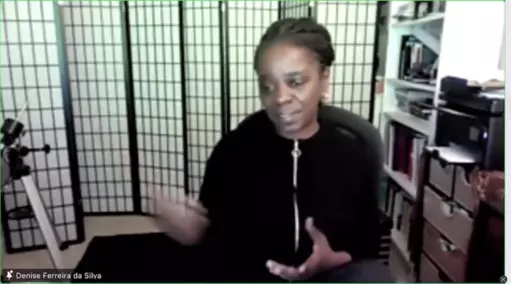
Originally published in Otherwise Worlds: Against Settler Colonialism and Anti-Blackness (Duke University Press, 2020), this essay, "Reading the Dead: A Black Feminist Poethical Reading of Global Capital" by academic, philosopher, and artist Denise Ferreira da Silva is shared here in the context of the project Usufructuaries of earth, co-convened by BAK with artist Marwa Arsanios. This chapter is one of the readings for the Berlin reading group convened by Joud Al-Tamimi and Lama El-Khatib, titled “On Value-Disrupting Activity,” at Hopscotch reading room, 5 May 2024. This reading group explores the political and theoretical stakes of value as it links to violences enacted on and through land and property in Palestine and elsewhere.
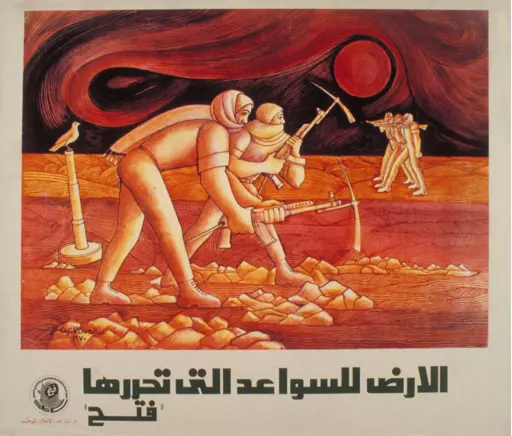
“What is a revolution that neither overthrows a state order nor institutes a lasting one of its own?” This is the question that teacher, author, and political theorist Nasser Abourahme poses in “Revolution after Revolution: The Commune as Line of Flight in Palestinian Anticolonialism.”
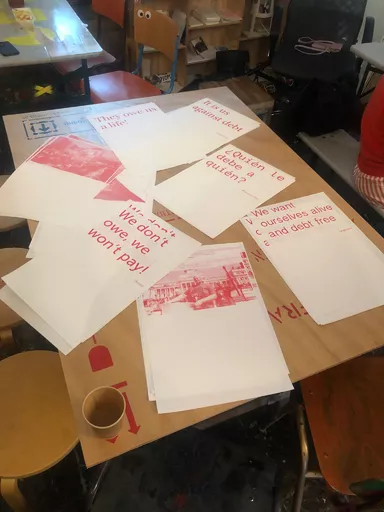
Three excerpts are republished here from researchers and activists Verónica Gago and Lucí Cavallero’s A Feminist Reading of Debt (London: Pluto Press, 2021). The text opens with a simple concept: that contemporary debt cannot be understood by only looking at “public debt,” and must instead look at the indebtedness present in everyday life. The authors call for debt to be adopted by social movements as a key issue, and furthermore, for people to be cognizant of the links between debt and sexist violence.
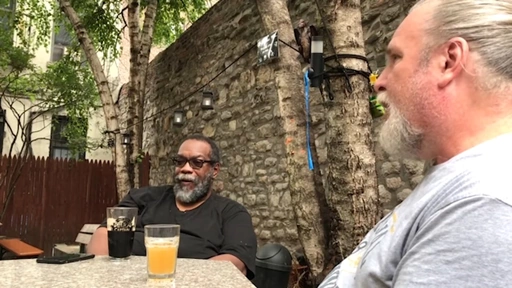
This is an extract from the chapter “Debt and Study,” in Stefano Harney and Fred Moten’s The Undercommons: Fugitive Planning & Black Study (2013). Across its three sections—Debt and Credit, Debt and Forgetting, and Debt and Refuge—this extract traces the sites and practices of “desired” and undesired debt that perforate contemporary financial capitalism and western culture. The text moves through different people who are marked as debt carriers, such as the precariat, the student, and racialized people, among others.
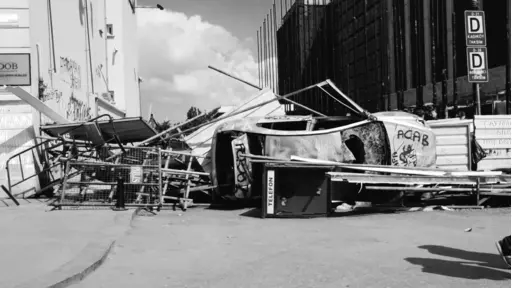
“Riot Now: Square, Street, Commune” is a chapter from political theorist Joshua Clover’s Riot. Strike. Riot: The New Era of Uprisings (Verso, 2016). Taking the classical Greek agora—a place of assembly and commerce—as a starting point, Clover suggests that it is perhaps no coincidence that many of the riots and occupations that emerged in recent decades either happened or began in modern squares. He speaks of how this emergence of rioters corresponded to “an underlying political-economic unity, a material reorganization of society, which provide[d] them a shared set of problems and a shared arena in which to confront them.”
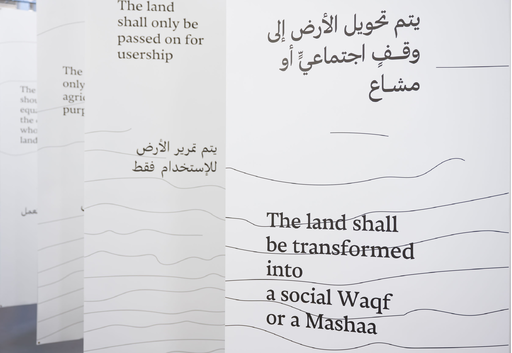
Charting the interconnectedness of capitalism, colonialism, and nationalism, Peter Linebaugh’s “Palestine & the Commons: Or, Marx & the Musha’a” speaks of “the violence of mapping, titling, buying, and selling which cast people into cities and camps following their expropriation from the land.”
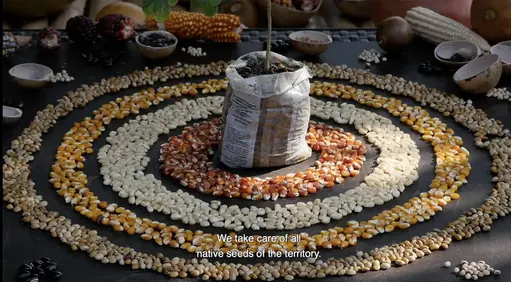
Originally published in Kohl Journal, this interview is between Samanta Arango Orozco, a member of Grupo Semillas, and the artist Marwa Arsanios, who is co-convening with BAK the multi-chaptered project Usufructuaries of earth until 2 June, 2024.
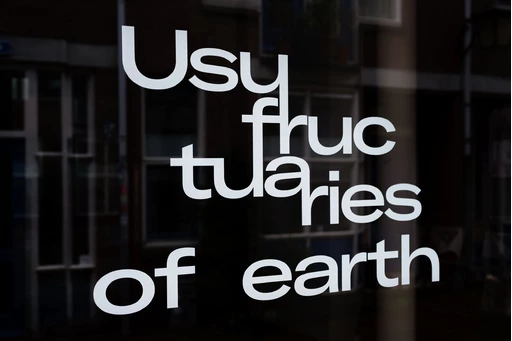
A slow-growing table of contents for the Usufructuaries of earth online reader. The reader emerges, to begin with, as a constellation of archival texts assembled here through the “Usufructuaries of earth” focus on Prospections. Throughout the duration of Usufructuaries of earth project and beyond, diverse content—long reads, interviews, conversations, and visual interventions—will incrementally be (re)published into a public research and learning curriculum that studies histories and propositions of usufruct, of renewing shared practices of usership of and with earth.
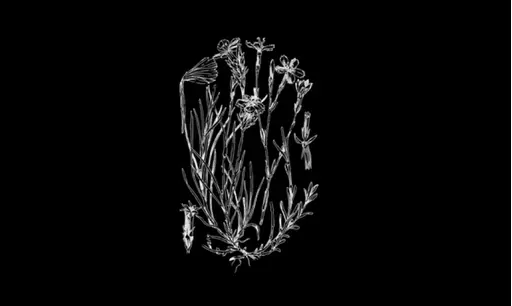
“We are in the siege of a nature that has been hurt, divided, defiled, poisoned, harmed, and made to bleed,” writes Pelşîn Tolhildan, member of the Kurdish Women’s Movement.
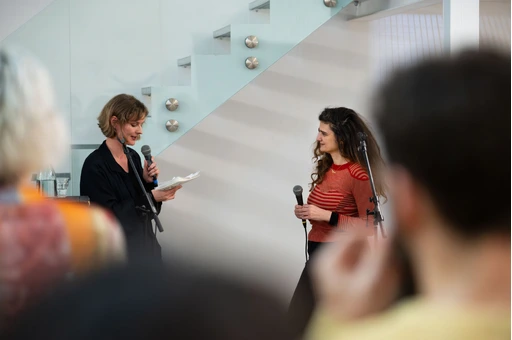
Usufructuaries of earth is the first comprehensive exhibition of Marwa Arsanios’s work in the Netherlands. The exhibition foregrounds the artist’s collaborative approach to bringing together ecological, feminist, and decolonial knowledges and practices that put forward ideologies of usufruct, unhinging property-relations from the idiom of individuated possession and toward forms of common, more-than-human userships. Here is an audio tour of the exhibition given by BAK convenor of research and publications Wietske Maas.